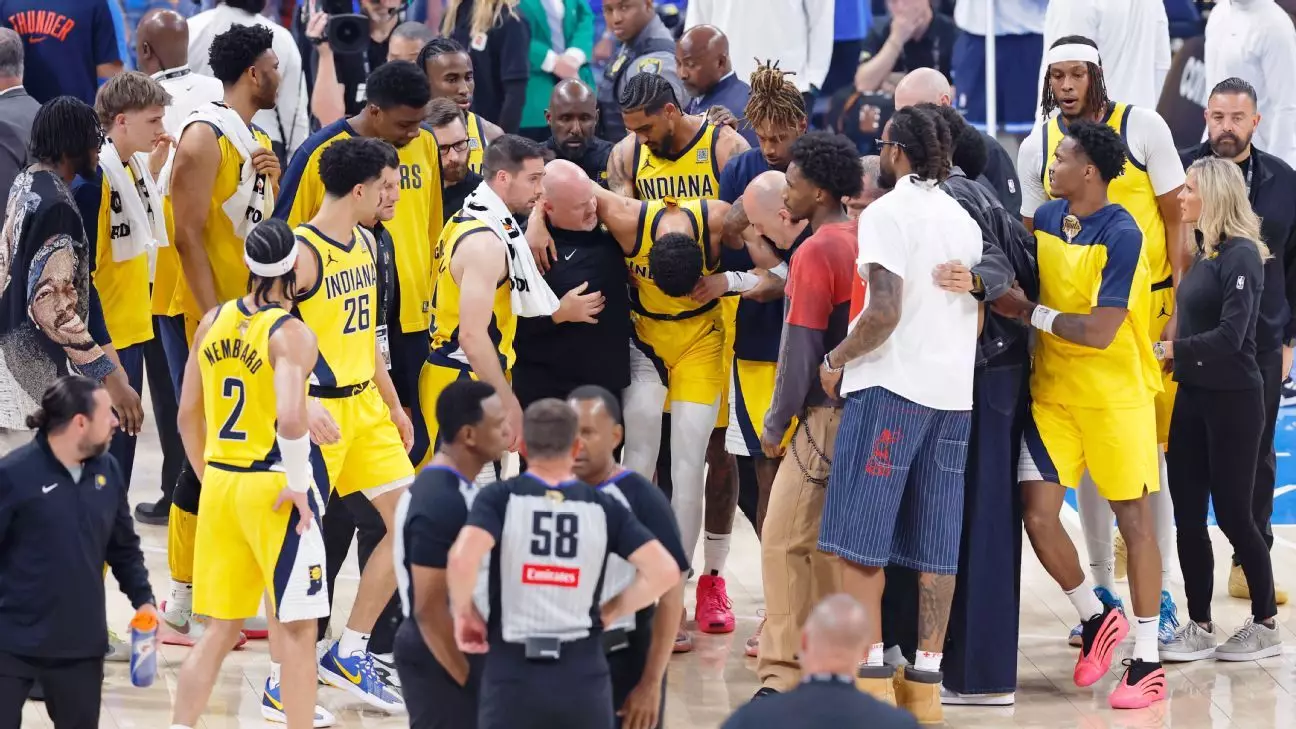In the world of professional sports, few narratives resonate as powerfully as that of sacrifice and determination. Tyrese Haliburton, the rising star of the Indiana Pacers, recently etched himself into the annals of NBA lore, not just for his commendable play but for exhibiting a compelling blend of courage and dedication. Facing a calf strain, Haliburton chose to maintain his presence on the court, a decision that ultimately culminated in a devastating Achilles tear during Game 7 of the NBA Finals. His emotional social media message encapsulated the monumental risks athletes take and the mental fortitude required to confront adversity head-on.
It’s crucial to dissect Haliburton’s decision to play despite his injury. On a fundamental level, it shines a light on the cultural expectations surrounding sportsmanship and heroics. Athletes are often lionized for “toughing it out” when faced with physical limitations, and Haliburton is a prime example of this mentality in action. His assertion—“I’d do it again, and again after that”—underscores not just personal sacrifice but a sense of duty towards his team, his city, and his fans. However, such ideals prompt us to question: How far is too far? The pressures to perform can blur the lines between resilience and recklessness.
The Price of Ambition
Haliburton’s emotional turmoil is palpable in his post-injury reflections. Following a game where he was instrumental in the Pacers’ impressive playoff run, he was left grappling with the raw, stinging disappointment of premature aspirations torn asunder. The narrative he shares—the frustration of hard work meeting an untimely end—echoes the broader struggles athletes face when their bodies fail them. “The pain of this letdown,” he writes, “is unfathomable.”
This raises an essential conversation about mental health and sports. We often celebrate athletes for their physical accomplishments but overlook the silent battles they endure. Haliburton’s feelings of shock and sorrow pave an important path for those who reach for greatness but fall short due to unforeseen circumstances. His words cut through the usual clichés of “bouncing back” and “coming back stronger,” revealing an authentic struggle that many will empathize with. “What hurts most is my mind,” he expressed, capturing the often-ignored psychological impact of sports injuries.
Grit in Adversity
As Haliburton embarks on the arduous journey of rehabilitation, he emphasizes an intriguing outlook on hardship: “I don’t ‘have to’ go through this, I get to go through this.” This perspective is not merely optimistic; it’s a reflective choice that highlights resilience in the face of adversity. It acknowledges the challenge ahead while framing it as an opportunity for growth. This mindset is paramount in sports and beyond, especially as it allows individuals to reclaim agency in discouraging situations.
But even with such a resilient stance, one must ask if society’s ‘tough it out’ doctrine demands too much from athletes. With Haliburton’s injury now part of the NBA’s collective narrative for the year, it’s time to reevaluate how we support these athletes as they strive to reclaim their health and careers. There’s an inherent tension between the audience’s expectations and the athlete’s well-being. As fans, we often forget the price of witnessing our heroes struggle for glory.
The Broader Implications
Haliburton’s injury isn’t an isolated episode; it reflects a troubling trend as top-tier athletes face similar fates, creating a ripple effect throughout the league. With fellow stars like Damian Lillard and Jayson Tatum also sidelined due to Achilles tears, one must ask whether the increasing prevalence of such injuries indicates a pattern of overexertion driven by competitive pressures. The implications resonate throughout the league and challenge both management and fans to consider their role in what ultimately happens to these players.
Amidst the heartbreak and harsh realities, Haliburton’s strong spirit resonates far beyond the game itself. His emotional vulnerability serves as an important reminder that behind every jersey lies a person, grappling with the aftermath of ambition and the ferocity of competition. Whether he emerges from his recovery stronger or is left to navigate the complexities of mental and physical rehabilitation, Haliburton’s journey will undoubtedly continue to inspire and ignite dialogues about athlete support and wellness. The essence of his narrative encapsulates what it means to fight not simply for triumph but for identity, community, and the broader fabric of sport itself.

Leave a Reply